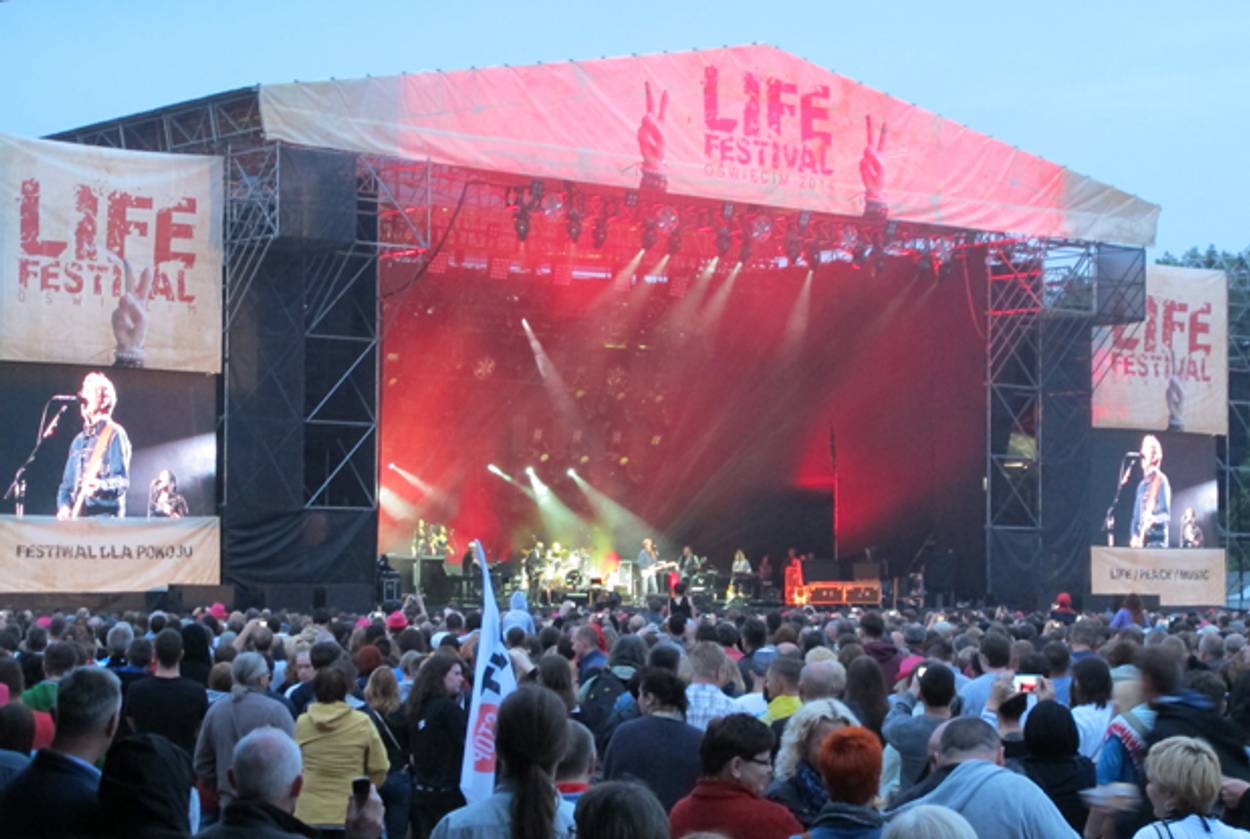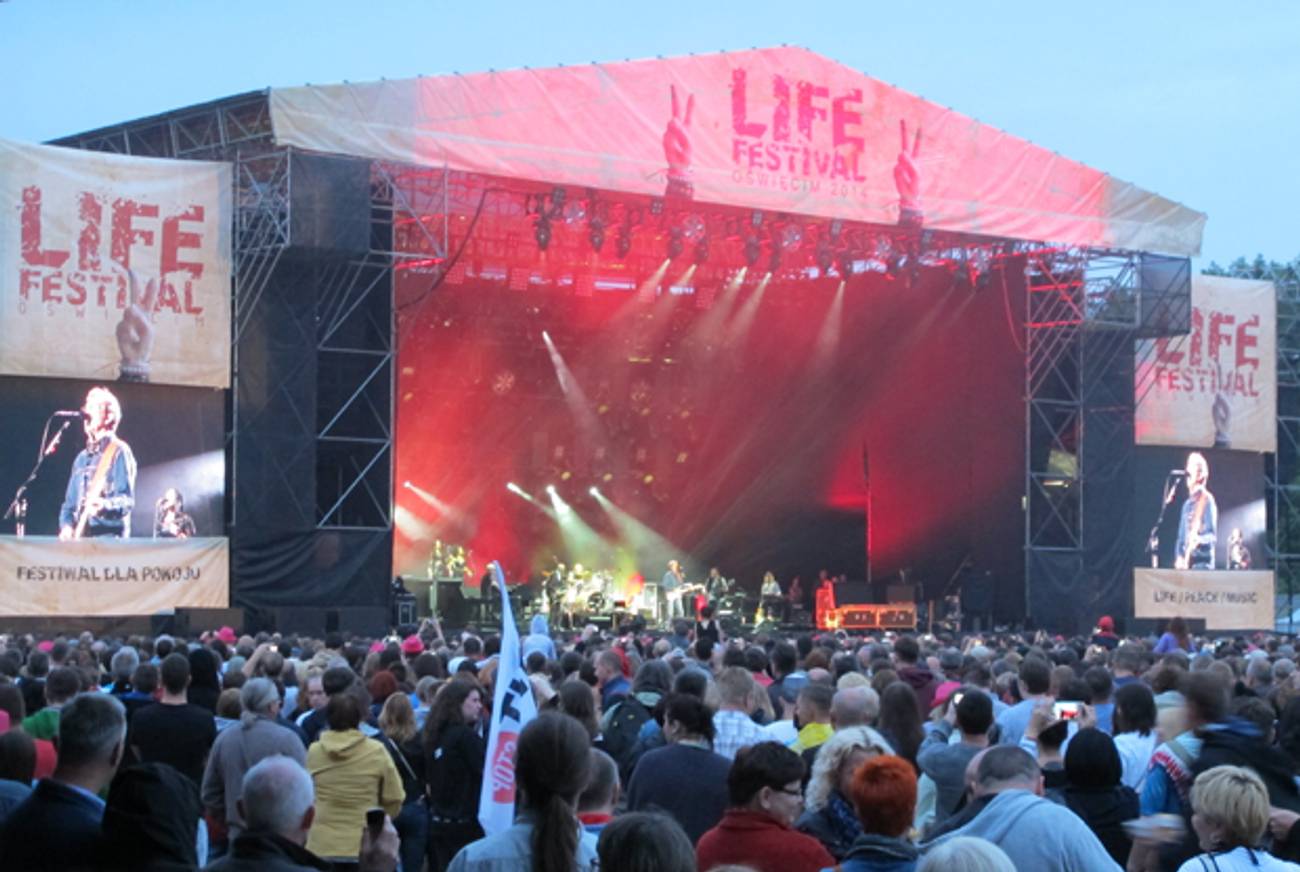Eric Clapton at Auschwitz
The singer headlined the fifth annual Life Festival in Oswiecim, Poland




The Rolling Stones may have played in Israel this summer, but Eric Clapton played at Auschwitz.
Well, not at the Auschwitz death camp, which is now a memorial museum. But in Oswiecim, the town in southern Poland outside which Auschwitz was built.
Clapton’s 90-minute set was the final performance of the annual Oswiecim Life Festival, an event founded in 2010 with the aim of using music and the arts to fight anti-Semitism, racism, and xenophobia, sending “a message of peace and tolerance” from the place that is a universal symbol of the Holocaust.
The festival was the brainchild of Darek Maciborek, a well-known radio DJ who was born and still lives in Oswiecim. It’s one of the latest steps in Oswiecim’s ongoing struggle to redefine its role as a real, living city—and not just an appendage of the death camp where the Nazis murdered at least 1.5 million people, most of them Jews.
The Festival music line-up each year features a variety of Polish and foreign bands, including Jewish and Israeli artists, as well as big name stars. Matisyahu, Peter Gabriel, James Blunt, and Sting have headlined previous festivals.
More than 10,000 fans spread out on the grassy field of Oswiecim’s stadium Saturday night to hear Clapton play a scorching set of old hits such as “Pretending,” “Cocaine,” “Hoochie Coochie Man” and “Layla”—the acoustic version. His performance in Oswiecim was the last stop on his four-month world tour.
Stalls sold beer and Polish kielbasa, T-shirts, and CDs. But in line with the theme of the Life Festival, there was also a booth staffed by an anti-hate speech organization and another promoting the Auschwitz Jewish Center, an education center founded in 2000 in a former Jewish residence in Oswiecim, which also houses the town’s only surviving synagogue. The center’s newly revamped museum highlights pre-Holocaust Jewish life in Oswiecim, which then had a largely Jewish population.
Unlike some previous headliners, Clapton did not comment publicly on what it meant—or felt like—to perform just a couple of miles from the Arbeit Macht Frei gate.
“This is the fifth Life Festival,” Tomasz Kuncewicz, the director of the Auschwitz Jewish Center, told me. “Five years ago no one was sure how people would react—whether there would be bad publicity or something,” he said. “But after five years it has become, shall we say, normal, even to the extent that he didn’t say anything.”
Clapton took the stage after four supporting groups, including the Israeli band Kerach 9, some of whose songs are based on the poems of a child from the Lodz Ghetto who was murdered at Auschwitz.
The Israelis did, however, have something to say.
Playing at Oswiecim provoked “a complicated feeling because we all know what happened here,” Kerach 9 frontman Noam Rotem said in a video posted by the Life Festival. “But I really tried not to think about it today on stage because today on stage I came to do the things we do best. I think the whole purpose of this festival is trying not to forget the past but to put it behind in some way and let life move forward. And we are part of it and it’s a great privilege for us.”
Drummer Uri Meiselman added, “I’ve visited Oswiecim many times as an educator because I’m also guiding groups and do all kinds of educational activities. I believe that the next time I will come, in a month, I will see the whole place in a different way. We’re thinking about seeing it with a view for the future.”
Kerach 9 went on the next day to perform at the Jewish Culture Festival in Krakow, an hour’s drive to the east.
Ruth Ellen Gruber writes frequently about Jewish cultural and heritage issues and coordinates the web site Jewish Heritage Europe. Her Twitter feed is @ruthellengruber.